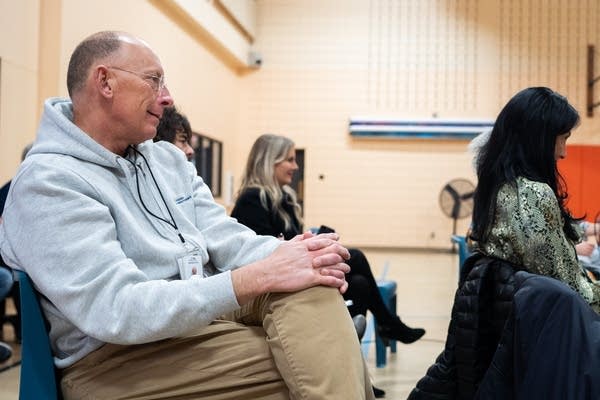Healing incarcerated women through storytelling and song

Go Deeper.
Create an account or log in to save stories.
Like this?
Thanks for liking this story! We have added it to a list of your favorite stories.
As a singer hits the high notes of a tune about never having to walk alone, women dressed in prison-issued gray sweats and white tennis shoes pass around a box of tissues.
"It's all right, you can dry the tears from your eyes," vocalist Robert Robinson tells them.

It was one point of a 90-minute show that moved almost the entire room of about 100 women imprisoned at the Shakopee facility to tears.
A nonprofit group called The Black Storytellers Alliance brought performers from all over the country to the women's facility for a single day in March. The group, which received a nearly $18,000 grant from the Minnesota State Arts Board, sought incarcerated women as a new audience with the goal of helping them embrace their humanity through song and African folktale.
Turn Up Your Support
MPR News helps you turn down the noise and build shared understanding. Turn up your support for this public resource and keep trusted journalism accessible to all.
The program, dubbed "The Journey," was filled with metaphorical life lessons. Storyteller Dylan Pritchett, of Williamsburg, Va., kicked it off with a story about a young girl who ended up marrying a fish. But in the end, her father killed the fish.
The women listening to the tale immediately recognized the reason why the father killed fish: It was different.
"From beginning of time, people think something is wrong with being different," Pritchett told them. "Hair color, skin color, where you live, where you're from, how you talk."
Organizers say the goal of the show was not to lecture the women, but get them to think through the points of the stories, whether in the moment or later. They were stories about right and wrong, love, strength and overindulgence.

When Tiesha Moore heard about the program, she made sure she signed up to go. She says the prison offers programs that include Bible study, library time and college classes.
"People can change, everyone can change. You just have to want it," she said. "And you have take advantage of what you have in front of you, and no matter where you came from, you can make it and do better."
Moore was among the women who were given permission to attend the show after demonstrating good behavior. The 31-year-old is serving a four-year sentence for assault and other charges. She said programs like this inspire her to change and give her hope for the future.
"It makes a difference. As I came in here, I was a destructive person," she said. "Me taking advantage of the programs that they offer, I changed my life a lot."

It's important for the incarcerated women to connect with outside groups, said Tracy Beltz, warden of the prison.
"Our mission is when they're with us, we want them to focus on what they need to do so that when they can get out, they stay out," she said.
Vusumuzi Zulu, co-founder of the Black Storytellers Alliance, said the group has performed at various correctional facilities in the past, and has more performances planned this summer and fall in the community. But when Zulu wrote the grant proposal under a Minnesota State Arts Board Arts Access program that helps organizations identify underserved communities, he made sure to target the women's prison.

Women are less likely than men to return to prison, according to figures from the Minnesota Department of Corrections.
Among women released from prison in 2013 and 2014, 35 percent returned to prison within three years either for a new felony sentence or a technical violation, such as missing a check-in appointment with a probation officer. In comparison, the rate for men was 52 percent.
Quoting an African proverb, Zulu said, if you educate a man, you educate him alone, but if you educate a woman, you educate generations. He said many of the women hearing the message of his group will one day return to the community after they complete their sentences.
"They must feel welcomed into that community and that they're bringing something of value into that community," Zulu said. "Being a prisoner is what they may be, but it's not who they are. Who they are is that intrinsic, internal thing about their humanity, and that's what we reach for."
Correction (May 23, 2019): In an earlier version of this story, Tiesha Moore's name was misspelled in a photo caption. Another photo caption included incorrect information about the story Elisha Minter told during the performance.
Dear reader,
Political debates with family or friends can get heated. But what if there was a way to handle them better?
You can learn how to have civil political conversations with our new e-book!
Download our free e-book, Talking Sense: Have Hard Political Conversations, Better, and learn how to talk without the tension.




